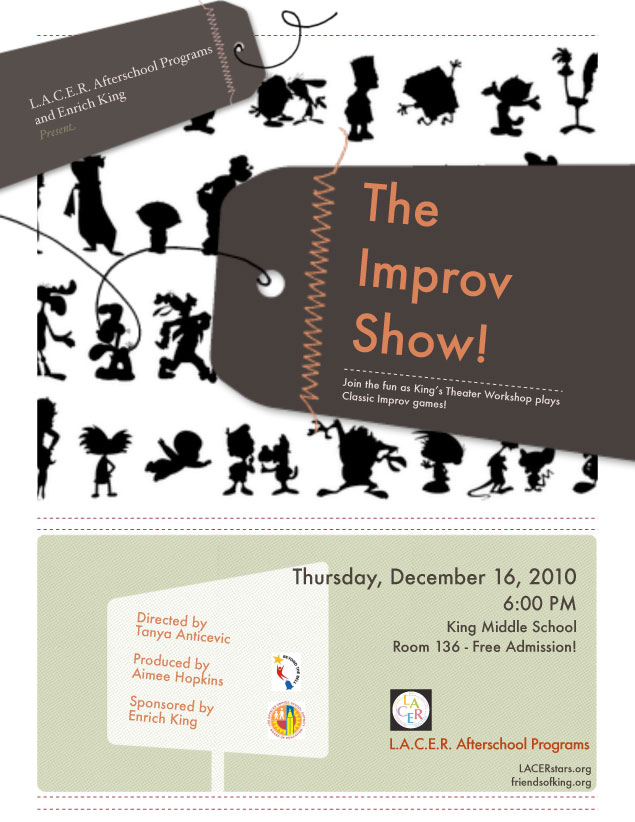Play ACTion workshop
This workshop/class involving Theatre Games and Improvisation can be tailored to any specific age group, in addition to being modified for the classroom environment. It is inspired by Viola Spolin’s methods of teaching theatre through games. Many children play these games without realizing how important they are in theatre, or how much they are learning while having fun! It is the beginning building block, or foundation, for all future classes in the sequence.
The content for the workshop can be classified in the following categories, all of which flow in a natural progression for the development of the student performer:
Getting On Stage
These games introduce students to several fun ways of learning important theatre terms and concepts, such as Blocking and Stage Pictures. It will give performers the foundation for communicating throughout classes.
Tongue twisters and Warm-Ups
Preparing both physically and vocally with games like Energy Ball and Mirrors, in addition to using song, tongue twisters, and vocal exercises.
Anytime and Circle Games
The games in this category, such as ZipZapZoop, Give and Take, One Word Story, aim at developing concentration, focus, listening skills and improving memory- all of which are very important for future activities.
Improvisation
Improvisation helps with learning to “Act” – why? Because the aim is to answer “how can we have a “planned” way of action while trying to find a “free” way”. The use of improvisation is vital to freeing the student imagination, and being more comfortable not knowing what is coming next, as it is in “real life”. These games, like Who, What, and Where, Yes Game, Freeze, Gibberish, will introduce student to the “Basic Rules” of improv. Eventually students will see how they can build upon these experiences and how to use improve skills in scenes and monologues etc…
Creating Characters and using Objects
Students will learn to commit to a character and expand creativity On Stage, while having fun! They will learn how to give a character a life- the way they talk, walk, create a history as well as Object Transformation- through games and techniques such as Hot Seat, Visualization, Through The Door, Human Orchestra, Object Game etc… Once again students will be able to utilize these skill building exercises and techniques for later use.
Creative Performance
Students will develop original skits and scenes, using several different ideas for funny scenes as well as guessing games with the “audience”- or students who are not on the stage for the game.
Acting Techniques
No single acting technique proves to be more effective than another. In actuality, different acting situations call for different acting techniques. Once again, through the use of exercises, this workshop or class will focus on comparing and contrasting three of the most well known methods of acting and preparation:
There will be a focus on The “Method” as developed by Stanislavski and assimilated by Lee Strasberg- students will learn to draw on their own real life experiences and memories to help realistically portray a character and situation. And through the use of Relaxation and Sense Memory exercise they will learn to be able to ‘drop in’ to ‘ who and where’, quickly and effectively
Next, Sanford Meisner’s version of preparation includes the use of imagination, rather than real life experience to play a part or scene. Playing, using immediate behavior and responses relies on improve work as well as creating layers.
Stella Adler also said a realistic performance should not include the use of memories from the past, but rather use the Given Circumstances to build a character and scene. Students will experience this by carrying through a task, wants, needs and objectives and stimulating the imagination with “What If’s”.
Monologues, Scene Study and Plays
Having had as preparation previous games and exercises, students are now ready to learn to analyze text, take direction, rehearsal techniques and character development, and Bringing Text to Life!
At this point it will be a good idea to remove any possible amateur qualities in performance, by going back over what was learned in a previous workshops, with exercises to prepare the player for the stage. No awkward stage movement, or mechanical reading or dropping cues! This can be a reminder to be sensitive to creating interesting stage business, understand and make meaning of their words, and have an understanding of group relationships and involvement.
With this, there will also be a focus on the importance of props, costume, sound and effects, make-up and sets.
An Actors Audition
Based on an insightful study and How- To book by David Black. For any actors deciding to go to the next level, and learn about the art of auditioning – for anything!
The Monologue- learn to focus on appearing as yourself, becoming someone else, performing the monologue, taking your bow(exit) and reviewing you audition.
A Reading- make your specific contribution, using your script as prop, treating your partner as if already rehearsed, and most importantly, inventing a goal and showing your acting range. Things to do during a cold reading are also explored. Previous work in improve and games will be helpful once again.
The interview- what interviewer wants to know have your own, personal, monologue.
Interactive Children’s Games
Aim: Using games to turn a child’s innate playfulness into constructive creativity.
What a dull and serious world this would be if we didn’t have games!
Games provide a launching pad to fun and fantasy for children of all ages. Children play to learn more about themselves and the world around them. Games can represent real-life situations, they have built in controls but they are still full of all sorts of personal and social possibilities for knowledge and growth. Games are attractive and valuable in a child’s life. They perpetually revive children and render them better able to deal with the vicissitudes of real life and the school day. If “children’s play is children’s work”, then games enable a child to work more effectively. As children are gradually conditioned by adult culture, they start to put all games, fun and free time into a category called ” PLAY” and put tasks, tests and lessons into another called “WORK”.
How can children benefit from instructional game playing?
During the process of growing up we tend to forget that a child’s life is not always enviable and carefree. We forget that being a child entails consistently braving the unknown natural and social dangers and striving to master mental and physical challenges that keep changing as their minds and bodies grow.
Games can help children not only cope with this situation but also thrive and flourish in it. Aside from the overall fun of game playing, children can have and create a delightful, controlled environment in which they can exercise their bodies and mind.
As children, games taught us how to work together, to accommodate and to help one another. Because most games have winners and losers, children learn to accept positive and negative outcomes. Game playing also offers ample opportunities for children to build self-confidence and enhance self esteem. Aside from the overall fun of simply playing, there are two general groups of benefits:
Skill – building benefits
- Learning value of goals –the patience, determination, and balanced self assessment required to meet these goals
- Gaining respect for rules and procedures ( they certainly abound in adult life!)
- Realizing their own capabilities and those of others – thereby cultivating patience and acceptance regarding their limitations and those of others.
- Appreciating healthy competition- you can compete and still be friends and close to someone without losing your independence
- Understanding meaning of being fair and honorable
Comprehension – building benefits
- Increasing their powers of concentration, memory and creativity
- Improving their physical coordination, strength, flexibility and energy management
- Learn how to follow directions, interpret signals, make quick decisions,solve problems and resolve conflicts
- Enhance and improve use of language and communication
- Develop a better ability to estimate and utilize time , space, and resources
Which games would be appropriate for different age groups and why?
All games for children, regardless of age, can be put in the same six basic categories or formulas, with obvious room for overlap:
- Circle Games – players perform the same activity, taking turns or in unison
- Acting-Out Games – players engage according to cues in imitation, impersonation, or dramatization (this can include my theater and improvisation games inspired by Viola Spolin)
- Race Games – players compete to reach a goal first
- Capture Games – players alternate between being searchers/chasers, r being the object of searches and chases
- Combat Games – mostly for older players, and more suitable for out-doors or large gymnasium; players wage mock battles or rather staging situations of “attack-defense”
- Strategy Games – most suitable for small classroom and groups/teams; players can use mental or physical skills in a series of maneuvers to outscore opponents
Early Childhood
Ages 2 to 5 – Examples
Children under age five are still very self-absorbed, and have difficulty collaborating and cooperating in games that require concentration, and they don’t easily accept the idea of losing. In the early years children crave order, repetition and rhythm. Two and three year olds enjoy one to one imitation exercises, chases and simple circle games. As three to five years olds are rapidly accumulating language skills, they relish games with chants, verses, and nonsense words. They are also experimenting with getting along together, and respond well to group acting out games, and some are more physically coordinated than others.
Duck Duck Goose, Simons Says, Musical Chairs, Hot & Cold, London Bridges, Mulberry Bush, Pin the Tail…, Contrary Children ( opposite of simon says), Kitty Wants a Corner, How Do You Do Shoe, Pass The Present, Prince/cess Tiptoe, Rain, Sneeze ..
Middle Childhood
Ages 5 to 9 – Examples
At this stage of development children are swiftly acquiring interpersonal skills and they can tolerate the concept of winning some and losing some. Children are now ready for more advanced/complicated circle games, intricate capture games, demanding strategy games, and sophisticated races.
I Packed My Bag, Aesops’s Mission, Art Consequences, Auction, Alphabits, Baby in the Air.
Late Childhood
Ages 9 to 14 – Examples
Children in this age range like games that give them a chance to display their intelligence and perceptiveness. They are keenly interested in expanding their repertoire of task-related skills and techniques, and are generally enthusiastic about card games, board games, and table games. Advanced capture games and games with two opposing teams are increasingly attractive at this stage.
On a final note, I am also very excited about my ACTion Workshops which are specifically Theatre Game, Creative Play and Improvisation based. All ages can benefit from incorporating Theater games and Improvisation into the Interactive Games planning.( In addition, it’s possible for Elementary and Secondary teachers to learn the potential of Theatre Games and Improvisation for solving pedagogical problems. Since their operational structure corresponds to Jean Piaget’s stages of intellectual development in children, it is perhaps not surprising that they have effectively assisted learning in many areas of the curriculum. ) I have been inspired by Second City and Viola Spolin’s idea of teaching theatre through games. Many children play these games without realizing how important they are in theatre, or how much they are learning while having fun!
Why use an outside source for what children do naturally?
Simply put, because, I am an excellent game facilitator and instructor! I can make the experience more lively and pleasurable because I share their enthusiasm.
Through playful moments, in a classroom environment, a gymnasium and/or after school, children can act out real life situations- in imagined contexts they can learn how to solve problems, look for options and resolve conflicts.
Children’s games have always prepared them for a successful life as a fully realized human being. Ask anyone you know and they will say that the games they experienced as a child remain powerful memories in their minds and hearts throughout their adult years.
I can remember very clearly getting anxious and distraught whenever it was time to play any sort of game at school. Because of this I can empathize greatly with student’s aptitude, ability and comfort levels.
While children instinctively know how to play they need a more experienced mind to teach them. With gentle, upbeat guidance and instruction children can learn the methods and means of organized cooperation, competition and interactive game playing, while at the same time unleashing the powerful forces of their creativity.











